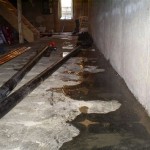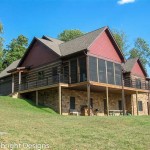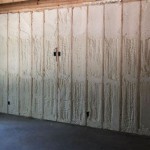Best Flooring Options for a Concrete Basement Floor
Basement floors, typically constructed of concrete, present unique challenges when it comes to choosing the right flooring. Concrete is inherently cold, hard, and susceptible to moisture issues, potentially leading to discomfort and damage if the appropriate flooring solution is not selected. Therefore, careful consideration must be given to the characteristics of the basement environment and the desired functionality and aesthetics of the space before making a final decision.
Selecting the ideal flooring for a concrete basement floor involves balancing durability, moisture resistance, comfort, and cost. Several options are available, each with its own set of advantages and disadvantages. This article will explore some of the most popular and effective flooring choices for concrete basements, providing detailed information to aid in making an informed decision.
Understanding the Challenges of Concrete Basement Floors
Concrete basement floors pose specific challenges that must be addressed when selecting flooring. These challenges primarily revolve around moisture, temperature fluctuations, and inherent hardness.
Concrete is porous and can absorb moisture from the ground. This moisture can lead to the growth of mold and mildew, which can be detrimental to both the structural integrity of the flooring and the health of the occupants. Furthermore, excess moisture can cause warping, buckling, or delamination in certain types of flooring materials. Therefore, moisture resistance is paramount when selecting basement flooring.
Concrete is also a poor insulator, meaning it readily conducts heat. This can result in cold floors, especially during the winter months. Insulating properties should be considered to improve comfort and reduce energy costs. Adding a subfloor with insulation qualities can mitigate this issue or can be found in certain flooring products.
Finally, concrete is a hard surface, which can be uncomfortable to walk on for extended periods. It lacks the give and resilience of other flooring options, potentially contributing to fatigue and joint pain. Choosing a flooring with some level of cushioning or adding a cushioned underlayment can address this concern.
Popular Flooring Options for Concrete Basements
Several flooring materials are well-suited for concrete basements, each offering different benefits and drawbacks. Some of the most popular options include epoxy coatings, engineered wood, luxury vinyl, tile, carpet tiles, and rubber flooring.
Epoxy Coatings: Epoxy flooring is a durable and seamless option that creates a protective barrier over the concrete. It is highly resistant to moisture, chemicals, and stains, making it well-suited for basements that are prone to dampness or flooding. Epoxy can be applied in various colors and patterns, offering a customizable aesthetic. However, epoxy coatings require professional installation as surface preparation is critical for proper adhesion. Further, epoxy can be a fairly rigid surface and may not provide the same level of comfort as other options.
Engineered Wood: Engineered wood flooring is a viable option for basements, provided proper moisture control measures are taken. It consists of a thin layer of hardwood veneer bonded to a plywood or high-density fiberboard (HDF) core. This construction makes it more dimensionally stable than solid hardwood, reducing the risk of warping or buckling in humid environments. A vapor barrier is essential beneath the engineered wood to protect it from moisture intrusion. While it offers the look and feel of hardwood, engineered wood is susceptible to water damage if exposed to prolonged moisture.
Luxury Vinyl Flooring (LVT/LVP): Luxury vinyl flooring (LVT/LVP) is a popular choice for basements due to its excellent moisture resistance, durability, and ease of installation. It is available in a wide range of styles and patterns, mimicking the look of hardwood, stone, or tile. LVT/LVP is also relatively soft underfoot, providing a more comfortable surface than concrete. Many LVT/LVP products are waterproof, making them ideal for basements that are prone to flooding. Installation can be done as a floating floor, requiring minimal subfloor preparation.
Tile: Tile, including ceramic and porcelain, is another excellent option for concrete basements. It is highly durable, water-resistant, and easy to clean. Tile is also available in a wide variety of colors, patterns, and sizes, allowing for diverse design possibilities. However, tile can be cold underfoot, and a radiant floor heating system may be desirable to improve comfort. Grout lines can be susceptible to staining and require regular maintenance. Similar to epoxy, tile is a rigid surface, and can be tiring to stand on for extended periods of time.
Carpet Tiles: Carpet tiles are a modular flooring option that can be a good choice for basements seeking a warmer and more comfortable surface. They are easy to install and can be replaced individually if damaged. Carpet tiles are available in various styles, colors, and textures. However, carpet is susceptible to moisture damage and requires proper ventilation and moisture control measures to prevent mold and mildew growth. Carpet tiles with a waterproof backing can help mitigate this risk.
Rubber Flooring: Rubber flooring is a durable and resilient option that is often used in gyms, playrooms, and other high-traffic areas. It is moisture-resistant, slip-resistant, and provides excellent cushioning. Rubber flooring is available in rolls or tiles and can be installed directly over concrete. It is also relatively easy to clean and maintain. While an extremely functional choice, the aesthetic options may be limited and sometimes not appropriate for certain design styles.
Factors to Consider When Choosing Basement Flooring
Before selecting a flooring option for a concrete basement, it is essential to consider several factors, including moisture levels, budget, intended use of the space, and aesthetic preferences.
Moisture Levels: Assessing the moisture levels in the basement is crucial. A moisture test can help determine if the concrete is absorbing moisture from the ground. If moisture levels are high, a waterproof or highly moisture-resistant flooring option is essential, such as epoxy, luxury vinyl, or tile. Installing a vapor barrier beneath the flooring can also help prevent moisture intrusion.
Budget: The budget is also a significant consideration. Flooring costs can vary widely, depending on the material, installation complexity, and desired features. Epoxy coatings and engineered wood tend to be more expensive than luxury vinyl or carpet tiles. It is essential to factor in the cost of installation, subfloor preparation, and any necessary moisture control measures.
Intended Use of the Space: The intended use of the basement space will influence the flooring choice. For example, a playroom may benefit from a cushioned flooring option like rubber flooring or carpet tiles, while a home gym may require a durable and slip-resistant surface like epoxy or rubber flooring. An entertainment area may benefit from the aesthetic appeal of engineered wood or luxury vinyl.
Aesthetic Preferences: Aesthetic preferences are also important. The flooring should complement the overall design and style of the basement. Consider the color, pattern, and texture of the flooring to create the desired ambiance. Samples of different flooring options should be obtained to evaluate their appearance in the basement's lighting conditions.
Subfloor Preparation: Proper subfloor preparation is critical for the success of any flooring installation. The concrete subfloor should be clean, level, and dry. Any cracks or imperfections should be repaired before installing the flooring. A self-leveling compound may be necessary to create a smooth and even surface. In some cases, a subfloor may be required to provide additional insulation or moisture protection.
Installation: The installation process will vary depending on the flooring material and the DIY capabilities of the homeowner. Some flooring options, like luxury vinyl and carpet tiles, can be installed relatively easily as a DIY project. Others, like epoxy coatings and tile, require professional installation. It is essential to carefully follow the manufacturer's instructions and recommendations for installation to ensure a proper and long-lasting result.

What Is The Best Flooring For A Concrete Floor Basement Illinado Llc

What Is The Best Flooring To Put On A Concrete Basement Floor

What Are The Best Flooring For Basement In Homes

How To Choose The Right Floor For Your Basement Gc Flooring Pros

6 Inspiring Ideas For Basement Flooring In Portland

White Bamboo 1 2 Inch 12mm Cork Floating Flooring

Best Basement Flooring Options Forbes Home

Best Flooring For Basement Renovations

Best Flooring Series 2 Basements Loveland Fort Collins

The Best Flooring Options For Your Basement From Forest Llc
Related Posts







